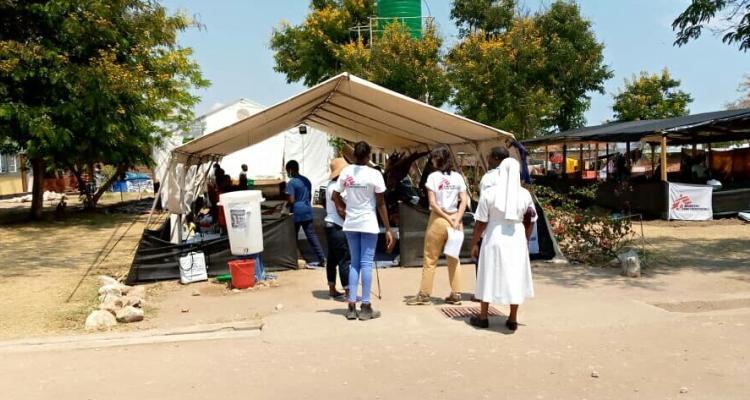
…sets up units with health care facilities
By George Mhango, Blantyre
Increase in cases of cholera in Mangochi—one of the 24 affected districts in Malawi—has forced the international medical humanitarian organization, Médecins Sans Frontières (MSF), to sound an SOS for provision of more medical supplies to deal with the disease.
This follows the visit to three treatment units such as Koche, Monkey-Bay and Cape Maclear in Mangochi by MSF France Head of Mission Malawi, Marion Pechayre, which was aimed at finding out how Cholera Treatment Units (CTU) are helping in dealing with the disease.
Pechayre noted that—while the organisation spends about K100 million monthly— other organisations should also include Mangochi, the lakeshore resort district, on the cholera vaccination list because cases are still on the rise.
The disease—according to health authorities—has claimed the lives of 209 people with 6,890 admissions since March 2022, when the first case was recorded in the Southern Region.
“We understand the government has secured 2.9 million oral cholera vaccines for the second campaign. Surprisingly, Mangochi is not on the list. We urge the government to include it because numbers are rising. Government should also procure more vaccines so that all affected areas should be reached out to,” she said.
According to her, MSF France set up treatment units, have the capacity of beds, latrines, bathrooms, handwashing stations and waste disposal zones to contain the spreading of the disease and treat patients infected with cholera.
“In the context of support to the Ministry of Health, we had already set-up a CTU at Koche Hospital comprising 3 admission wards with a capacity of 50 beds. This includes bathing and latrine facilities, water pumps, laundry area, morgue and waste disposal facilities,” she said.
MSF Wash Manager, Maness Neba Makondi has since told the media that at Koche alone, the organisation is providing buckets for bathing and laundry inside the CTU, sensitising guardians about the three bucket system of washing.
“We installed a 5, 000 litre bladder tank which is chlorinated, to be used as a backup water source when there are dry taps.
“We also have hygienists working in the CTU that receive on the job training on how to prepare and use the different chlorine solutions used inside a CTU,” said Makondi.
She, however, said the main challenge is to get the guardians to get accustomed to the hygiene protocols of the CTU, despite that the health promotion team and the hygienist team work tirelessly to ensure hygiene protocols are being followed.
Koche Hospital Administrator Sister Cecilia Namuthuwa was upbeat about dealing with the disease following reduction of cases being admitted to the facility.
“Three days ago (November 16) we registered 180 cases and that was the greatest, but as I speak numbers have gone down thanks to MSF initiatives. People die because they report late and lack enough staff,” she said.
MSF is also providing critical support to the hospital’s team on cholera patient’s management and donated supplies and consumables that included IV fluids, giving sets, gloves, cannulas, medicines and personal protective equipment (PPE).
During the visit, it was established that MSF France has also installed another 10-beds CTU in Monkey Bay apart from carrying out health promotion activities during which over 3,975 people with health and hygiene promotion messages have been reached out to.
Health experts say Cholera is an easily preventable and treatable disease if people follow some basic hygiene rules and go quickly to a health facility in case of symptoms.














